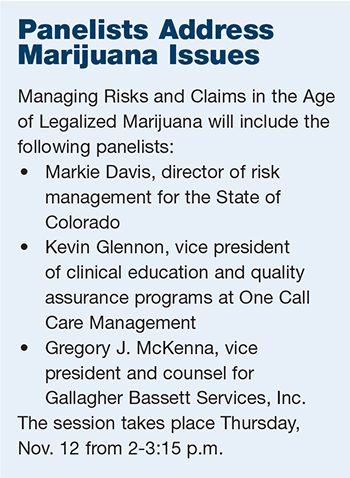NWCDC Session Preview
The Quandary of Marijuana in Workers’ Comp

The 24th annual National Workers’ Compensation and Disability Conference® & Expo takes place Nov. 11-13 at the Mandalay Bay Resort and Casino in Las Vegas. The conference is produced by LRP Publications, which publishes Risk & Insurance®.
Marijuana laws and changes in case law create a moving target for employers trying to protect their workers and remain compliant with state and federal laws and various regulations. A panel of experts will discuss recent changes, the nuances, and what employers need to do to best manage risks and claims.
 The employer’s obligations in the face of changing marijuana laws is the focus of the panel discussion, according to Denise Gillen-Algire, director of managed care and disability for corporate risk at Safeway Inc. and the session’s moderator. She says it’s incumbent on companies to understand the changing landscape and know how to respond.
The employer’s obligations in the face of changing marijuana laws is the focus of the panel discussion, according to Denise Gillen-Algire, director of managed care and disability for corporate risk at Safeway Inc. and the session’s moderator. She says it’s incumbent on companies to understand the changing landscape and know how to respond.
“With all the changes in state laws and the impact on the federal law what do employers need to do?” Gillen-Algire said. “How should employers view this? What changes do they need to consider in terms of their zero-tolerance policies and Americans with Disabilities Act?”
Many workers’ comp practitioners breathed a sigh of relief recently after a decision by a Colorado court. One question many had asked prior to the decision was: If someone has a medical marijuana card in a state where it is legal, uses the drug away from work but tests positive in a drug screening, is the employer obligated to allow the worker’s use of the drug if he has a condition protected under the ADA, or would disallowing it violate the reasonable accommodation provision of the ADA?
“The decision came down clear — it is illegal federally,” Gillen-Algire said. “Employers continue to have the right to have zero-tolerance policies regardless of the ADA, and because marijuana is still illegal federally, you can’t enforce the ADA under something that is illegal.”
But the issue remains a question for other jurisdictions. As Gillen-Algire points out, each state has different court systems and different developments.
“Employers continue to have the right to have zero-tolerance policies regardless of the ADA, and because marijuana is still illegal federally, you can’t enforce the ADA under something that is illegal.” — Denise Gillen-Algire, director of managed care and disability for corporate risk, Safeway Inc.
“New Mexico is on the hot seat right now with a decision that says medical marijuana is ‘reasonable and necessary medical care,’ and under the workers’ comp law if a worker has a medical marijuana card the payer must pay for the cost,” she said. “The court rejected the employer’s argument that it would be required to violate federal law by paying for the drug.”
That creates an additional challenge. “You’ve got medical marijuana growers that can’t deposit their money legally in a bank because the funds are from a federally illegal activity even though it may be legal in the state,” Gillen-Algire said. “So you’ve got issues with money laundering and activities that are questionable.”
Drug Policies
Much of the discussion will center around employer’s drug and alcohol policies. Many zero-tolerance policies may need to be rewritten, depending on the location. For example, laws in three states prohibit employers from firing an employee for a positive drug test if they hold a medical marijuana card.
“An employer that has a presence in multiple jurisdictions must be aware of the state laws,” Gillen-Algire said. “If you have a worker in Arizona, Delaware, or Minnesota, you need to amend your policies.”
In several states marijuana is allowed for recreational use. Employers in those states need to take care in how their policies are worded.
“Employers can’t have the same policy across the board. That’s a new day for employers,” Gillen-Algire explained. “Typically they have zero-tolerance policies enforced across the board, consistent across states. But employers need to be very aware of different state laws as well as case law decisions.”
Some experts have suggested employers craft their marijuana-related policies based on alcohol policies. While alcohol is legal away from work, most employer policies have zero tolerance for the presence of it in a worker’s drug screen.
One of the other challenges in dealing with marijuana in the workplace is that the drug can stay in a person’s body for days or weeks, but the drug’s effects may not be present.
“One of the panelists shared a tool that is supposed to be able to measure marijuana,” Gillen-Algire said. “Cannibuster is supposed to be a roadside marijuana test. It could become the holy grail in states where marijuana is legal.”
Carriers, Physicians
Additional questions the panel may address concern other stakeholders in the workers’ comp system.
“From the providers’ side, we need to consider what are the legal liabilities under standards of care and state medical boards, especially when they are combined with prescription medications,” Gillen-Algire said. “Also, how does that play in with evidence-based medicine?”
For insurers, there are additional challenges.
“With so many different state laws in place and federal considerations, how do insurance companies establish policies on how to handle claims so that there are standards in place instead of using personal decisions?” Gillen-Algire asked. “There will be discussions around the New Mexico case and other state laws requiring organizations to have a flexible policy approach.”











